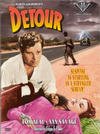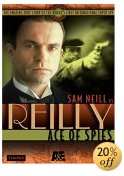
Director: Edgar G. Ulmer 1945
Some people fondly recall the libraries of their youth, those majestic palaces groaning with great books and staffed by friendly, knowledgeable librarians who would let a special kid take out a literary (grown-up) novel now and then. Well, I wish that was part of my childhood, but it just wasn't so. What I had was Jack's candy store in the shadows of the Auburndale Long Island Rail Road station in Queens.
For those too young to imagine a candy store not selling boxes of fancy chocolates, let me describe Jack's: upfront were newspapers (at least nine dailies in the early 60s), magazines, comic books, candy (Hershey not Godiva), cigarettes. Beyond was a long counter where Jack would pour Cokes, egg creams, ice cream sodas, malteds. And opposite the counter were the paperbacks, most in metal racks that squeaked accusingly when you turned them to get a better look at a particularly racy cover. Still going strong were Gold Medal books, mostly original novels, most with suspense-mystery themes and all sporting variations of the same cover: scantily clad female and tough-looking male, smoldering glances, perhaps a smoking gun. Some fine writers made decent dough writing for Gold Medal (John D. MacDonald, Donald Hamilton, David Goodis, Peter Rabe--even Gore Vidal, using the pseudonym Cameron Kay). For me, the Gold Medals and other paperbacks represented a mysterious, dangerous, adult world of sin and betrayal (pretty accurate come to think of it).
So why this trip down memory lane? For starters, it's fun--at least for me. And I was reminded of those paperbacks when I watched "Detour."
Shot in six days on a sub-Poverty Row budget, this is one nasty film. Tom Neal plays a moody New York piano player of limited success who hitchhikes his way to LA to reunite with his girlfriend. Somewhere in Arizona a man picks him up, treats him to dinner--then dies inexplicably while Neal is driving. What's a guy to do? In a movie like this, you ditch the body and assume the man's identity. Then--again inexplicably--you pick up a hitchiker named Vera (Ann Savage) and your life goes completely to hell, for Vera is one of the meanest, coldest, most merciless femme-fatales ever portrayed in the movies. If you thought Barbara Stanwyck was a piece of work in "Double Indemnity," check out Savage's Vera.
You can't escape fate, the movie says. The main characters in "Detour" are doomed by fate, although they seem to embrace their destiny, to revel in their bad luck. "Detour" is like an old paperback original come to life. I loved every pulpy 68 minutes of it so much I'm cracking open my tattered Gold Medals this afternoon.
















